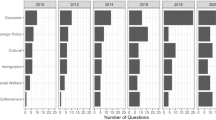Abstract
The determinants of recent U.S. districtcourt judges and appellate court judgesselection have been subject of much debate,but little systematic evidence has beenpresented to substantiate claims regardingdiscrimination against particular groups ofjudicial nominees, nor regarding the lengthof the appointment process. We study boththe length of the nominations process, andthe likelihood of confirmation andemphasize the role of Senatorial seniorityand agenda control in the confirmationsprocess. We find that Senators with agendacontrol have a positive effect on the speedand likelihood of confirmation and thatnominees from states with comparativelysenior Senators receive expedited treatmentrelative to other nominees. Althoughpolitics matter in the confirmationprocess, Senators are responsive to aperceived ``shortage'' of judges, since theyfill seats faster when a relatively largenumber of court seats are vacant. Nomineeswith higher personal qualifications arealso more likely to experience success inconfirmations. We found no evidence ofgender or race discrimination on the partof the Senate.
Similar content being viewed by others
References
Binder, S.A. and Maltzman, F. (2002). Senatorial delay in confirming federal judges, 1947–1998. American Journal of Political Science 46: 190–199.
Bond, J.R., Fleisher, R. and Kutz, G. (2002). Malign neglect: How Senate consideration of Presidential nominations has changed. Working paper, Texas A&M University.
Calvert, R.L., McCubbins, M.D. and Weingast, B.R. (1989). A theory of political control and agency discretion. American Journal of Political Science 33: 588–611.
Chase, H.W. (1972). Federal judges: The appointing process. Minneapolis: University of Minnesota Press.
Goldman, S. (1997). Picking federal judges. Lower Court selection from Roosevelt through Reagan. New Haven: Yale University Press.
Goldman, S. and Slotnick, E. (1999). Picking judges under fire. Judicature 82: 265–284.
Grossman, J.B. (1965). Lawyers and judges: The ABA and the politics of judicial selection New York: John Wiley & Sons.
Hammond, T.H. and Hill, J.S. (1993). Deference of preference? Explaining Senate confirmation of presidential appointments to administrative agencies. Journal of Theoretical Politics 5: 23–59.
Hartley, R.E. and Holmes, L.M. (1997). Increasing Senate scrutiny of lower federal court nominees. Judicature 80: 274–288.
Katzmann, R. (1997). Courts and congress. Washington, D.C.: Brookings Institution Press.
Kemper, M., Kemper, W.L. and Van Winkle, S.R. (2002). To advise and consent: The Senate and lower federal court nominations, 1977–1998. Journal of Politics 64: 337–361.
Massie, T., Hansford, T.G. and Songer, D.G. (2001). The timing of presidential nominatinos in lower federal courts. University of South Carolina, working paper, November.
McCarty, N. and Razaghian, R. (1999). Advice and consent: Senate responses to executive branch nominations 1885–1996. American Journal of Political Science 43: 1122–1143.
Nixon, D.C. and Goss, D.L. (2001). Confirmation delay for vacancies on the circuit court of appeals. American Politics Quarterly 29: 246–274.
Nokken, T.P. and Sala, B.R. (2000). Confirmation dynamics: Presidential appointments to independent agencies, 1953–88. Journal of Theoretical Politics 12: 91–112.
Saregentich, T.O. (1999). Task force on federal judicial selection. Justice held hostage: Politics and selecting federal judges. Citizens for independent courts. Administrative Law Review 51: 1031–1049.
Weingast, B. and Marshall, W. (1988). The industrial organization of Congress. Journal of Political Economy 96: 132–163.
Author information
Authors and Affiliations
Rights and permissions
About this article
Cite this article
Stratmann, T., Garner, J. Judicial Selection: Politics, Biases, and Constituency Demands. Public Choice 118, 251–270 (2004). https://doi.org/10.1023/B:PUCH.0000019906.11742.f8
Issue Date:
DOI: https://doi.org/10.1023/B:PUCH.0000019906.11742.f8




